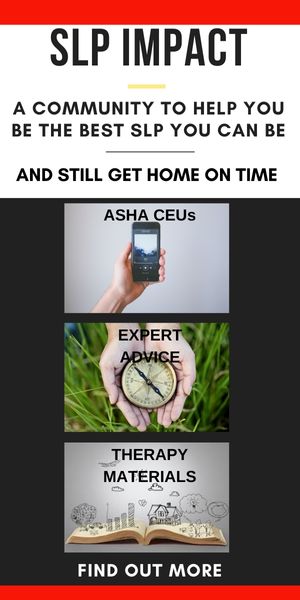Many undergraduates happily stumble upon the field of speech-language pathology through required science courses, like Language and the Brain. They may not realize right away what a speech-language pathologist (SLP) does and what education is required to get licensed–like that little thing called grad school. Yep, to become a fully licensed SLP, two more years of education beyond the undergraduate degree (among a few other things) is required. So, let’s start with the ASHA-approved textbook definition and then we’ll get to the real stuff.
A speech language pathologist diagnoses and treats children and adults with communication disorders, swallowing difficulties, socio-pragmatic disorders, and neurodegenerative diseases. They work in home, school, clinic, rehab, and hospital settings.
The field of speech-language pathology can be mysterious and we get asked all the time from hopeful students what an SLP is and what our job is like. That’s why we wanted to write this honest explanation on what a speech language pathologist is. Share your experiences in the comments and share this post with anyone considering the field.

What is a Speech Language Pathologist?
One of the cool things about our field is that there is a variety of jobs. At Bilinguistics, we work across many of the different types of SLP jobs.
Speech Language Pathologists provide services in Early Childhood Intervention Programs
Early Childhood Intervention (ECI) programs across the country serve children from birth until they turn three years of age. These programs are primarily home-based programs and they are federally funded programs that are not need-based. Any child between the ages of birth to three years who has a communication disorder and meets eligibility guidelines can get speech therapy through ECI. Ellen Kester noted, “I worked in the ECI world full-time for a few years. I loved working with families in their homes because you really get to know the families and can set up speech and language routines around their real lives. You also get to work with the parents and show them what you do so they can incorporate language enrichment strategies into their day. Drawbacks were that I spent a LOT of time in my car and I did not get a lot of time with colleagues, who were also in their cars.”
School-Based Speech Therapy Services
Many SLPs work in schools. Let’s dive into the pros and cons of the schools.
Pros: Well, let’s start with summers off! This works really well for those with kids who have summers off. Other great things about working in the schools–we get to serve a wide range of needs (e.g., articulation, language, social skills, stuttering) and ages. We also get to support children who may not otherwise receive speech therapy, and we work alongside teachers who have access to the children for 1,260 hours a year. Why is this important? If we collaborate well with the teacher, our students essentially get exposed to continuous speech and language strategies all day long at school. We also get to collaborate with other school professionals, including counselors, school psychologists, occupational therapists, physical therapists, and reading specialists.
Cons: There’s A LOT of paperwork involved in the school world. Report writing in the schools takes a ton of time, largely because it is paper based and requires getting teachers, parents, nurses, and others to fill out pieces of paper and give them back to you. Educational meetings can be stressful. When there are differences of opinions between school personnel and families, which unfortunately happens, meetings can be tense. And then there’s the constant feeling of being overloaded as caseloads grow over the course of a school year.
Clinic-Based SLP Services
Pros: You get to do 1:1 therapy with your clients AND you can do group options, such as social groups, in some clinics too. Reports are typically more succinct than school reports. In many clinics you get to collaborate with PTs OTs, Behavior Specialists, and medical professionals. There’s also the fact that parents typically bring children to the clinic so you get a chance to communicate with parents and show them what you are working on and how they can do that at home. And, when everyone is on the same page, it’s. win, win!
So, What is an SLP Job That You Want To Do and Which is the Best?
Again, my specific job has me working across many settings. Most SLPs work in one setting or maybe two, and every SLP has its pros and cons. School SLPs start early and can end earlier and get the summers off. Clinic and Home Health often let you set your own schedule but you work when there are the most clients which is often in the late afternoon. Hospitals have a pretty fixed schedule but you are moving all day long.
The good news is that you don’t necessarily have to choose. When you are a student you will rotate through many experiences and even after you start your career, you can shift to another setting to match your partner’s job or your kids’ schedule. You have to 1) start with school, 2) become a CF, and then 3) start your job and get paid! Let’s walk through the common questions.
What Education Is Needed to Become A Speech Language Pathologist?
After reading through everything that an SLP can do in a day you are probably wondering what education is required to become a speech language pathologist. The truth is that there is a lot we need to know but the programs and training that is set our prepares us well for the job. Most students begin by taking prerequisites as an undergrad or even get a B.S. degree in Communication. Then they start looking for a grad school.
The education needed to become a speech-language pathologist includes an undergraduate degree, typically in Communication Sciences and Disorders, Education, or a related field, AND a two-year graduate degree from an accredited program for Communicative Sciences and Disorders. Within these programs students take classes and also fulfil clinical training hours.
Grad school is packed with exposure to all of the major disorders such as Autism, voice disorders, expressive and receptive language delays, and speech sound disorders. There are hundreds of hours of practicum where you go out to the many different sites and get to work with clients. The speech language pathology education experience really lays the groundwork for you to do your job but that’s not the end! You are still mentored for another year as a CF SLP.

What is a CF SLP?
One thing that you need to know before you consider becoming an SLP is that we love acronyms. We even have acronyms where saying the letters takes longer than saying the word! So just what is CF-SLP?
A CF-SLP is a Clinical Fellow Speech Language Pathologist. The first year that a new professional works in speech pathology, they are under the guidance of a licensed SLP who has their Certificate of Clinical Competence or their “CCCs.” This is considered an internship year of sorts. It is a paid internship though. After finishing your year your signature will change from Jane Smith, M.A., CF-SLP to Jane Smith, M.A., CCC-SLP.
It’s a ton of training and can seem like it takes forever but the truth is that there are a lot of areas that our field has to learn about. The good news is that with your CCCs also comes a bump in pay!
What is the Average Salary for a Speech Language Pathologist?
There is a huge need for speech language pathologists and for those of us in the field you know that we are constantly seeing job offerings and being offered positions almost anywhere you would want to work. At the time of writing this, the U.S. Bureau of Labor Statistics stated that there are currently 158,000 speech language pathology jobs with an expected growth rate of 30% across the next decade.
If you have professional expertise in a special area like Autism or swallowing disorders, you will never be out of work. And, certain certificates or skillsets like speaking a second language can you get you a sign-on and annual bonus. Here are results from the top recruiting and employment websites on what they are reporting as the current salary of a speech language pathologist. These numbers vary widely based on geographic location and type of workplace.
| Source | Median Pay |
|---|---|
| U.S. Bureau of Labor Statistics | $50,370 -$122,790 |
| Salary.com | $71,000 – $97,000 |
| Glassdoor.com | $69,000 $130,000 |
| Zip Recruiter | $19,400 – $142,000 |
What is a speech language pathologist salary based on?
You can see above that there are some staggering differences between the salaries cited above. Why is that? There is a huge pay difference between early intervention, school, clinic, and hospital positions while these employment sites consider them all to be the same job. Secondly, some of the higher figures probably include administrators, professors, and clinic managers/owners.
I think that the Zip Recruiter numbers are probably the most telling because their site aggregates data based on zip code. So for a more accurate assessment I would go there, enter your zip code, and try to determine which job postings match the site that you want to work in.
Should I become a Speech Language Pathologist?
Okay, so down to the answer to the big question you have probably been asking yourself. For this, we need to share one more piece of data: Speech language pathologist who are surveyed are typically over 80% satisfied with many professionals staying in the filed for 20-40 years. It is a good salary which pays back the amount of time it took to learn the job. It is enjoyable enough to keep doing it. The field is varied enough that if you get bored you can remain a speech pathologist and work with a different age group or in a different setting.
Come on in! Bring your excitement. We’re waiting for you.





It all goes so fast! Before you know it, you will be retired with a wonderful pension from the state of Texas attending the college graduations of your children. It is a wonderful thing to be free during the summer for road trips, trips to museums and parks, library summer reading clubs, and VBS. You might even be lucky enough to love your job so much that you work part time for your district and make more money, pension and 45% combined, than you did your last 3 years as a full time SLP. Its a good life! That’s about 110-115% of your last 3 years salary and I work 17 hours a week. I would highly advise young mothers who don’t have to work full time, to maintain a part time position s with a district and state pension plan during your children’s younger years.
Kristine, thank you for your perspective. Our profession has so much flexibility, and that is a great thing. There are so many avenues we can pursue as SLPs. The best part–we make a difference in all settings. Congratulations on your retirement, and thank you for the time you have given.